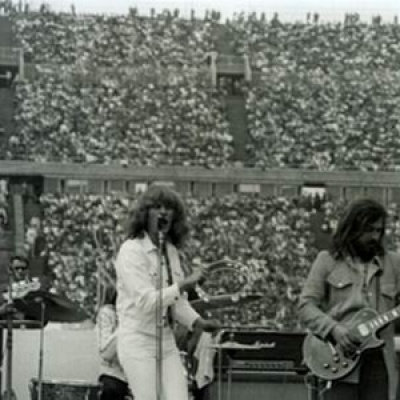
Omega
by Yuri German The most successful Hungarian rock band in history, Omega was formed in 1962 in Budapest by a group of friends. The lineup changed several times during Omega's early years and there was no consistent music style to speak of. Like with many other rock groups of the early '60s, the band's repertory largely consisted of songs by popular British bands of the period. Only in 1967, when they were joined by Gábor Presser (keyboards, vocals), did they began recording their own songs and issue a few singles. Presser's mixture of rock with elements of jazz and folk proved to be a winning formula. In 1968, John Martin, the manager of the Spencer Davis Group, invited them for a tour in Great Britain, where they recorded the album Omega: Red Star From Hungary for the Decca label. Later that year, they issued their first Hungarian LP Trombitás Frédi és a Rettenetes Emberek (Trumpeter Freddy and the Terrible People) that became their first golden album. The band sealed their success with two subsequent LPs: 10,000 Lépés (10,000 Steps) (1969) and Éjszakai Országút (On the Highway at Night) (1970). Their 1969 song "Gyöngyhajú lány" (The Girl With Pearls in Her Hair) became their first international hit and it was reworked by the Scorpions into "White Dove" in the mid-'90s. In 1971, keyboardist Gábor Presser and drummer József Laux left the band to form another group, Locomotiv GT. Presser was an especially sensible loss since he authored most Omega compositions at the time. Also, lyricist Anna Adamis followed her husband Laux to his new band. The breakup issue was later reflected in Omega's 1971 song "Hütlen Barátok" (Unfaithful Friends). With László Benkö, who was the band's original keyboardist and then played trumpet and flute, reassuming his initial position and Ferenc Debreceni becoming the new drummer, Omega reached its final lineup: János Kóbor (vocals), Tamás Mihály (bass, vocals), Ferenc Debreceni (drums), György Molnár (guitars), and László Benkö (keyboards, vocals). While under Presser, the band's sound tended to be somewhat psychedelic and fuzzy; with the new leadership, Benkö's classically influenced keyboards and Molnár's guitar assumed a much greater focus. Omega's fourth album, 200 évvel Az Utolsó Háború Után (200 Years After the Last War) (1972), was not released due to censorship problems. However, the band featured some songs from that forbidden album on Elö Omega, an LP recorded with some very basic equipment during a concert tour. The group became a frequent guest in East Germany and even recorded some songs in German. In 1973, producer Peter Hauke arranged a three-year contract for them with the West German label Bacillus. To expand its potential audience, Omega began to produce albums in two separate versions: English and Hungarian. Beginning with Time Robber (1976) and its Hungarian counterpart, Idörabló, released a year later, the band shifted toward progressive rock, with lengthy instrumental interludes, surging organ solos, and various electronic "space sounds." More albums in the similar style followed: Skyrover (and its Hungarian version Csillagok útján [1978]), Gammapolis/Gammapolisz (separate English and Hungarian versions, 1979), and Working (1980) (released in Hungary as Az Arc [The Face] [1981]). However, the band's 1980s albums began to show the obvious signs of creative stagnation. Soon after its 13th album, Babylon (1987), and a great concert on the occasion of the group's 25th anniversary, Omega disbanded. The early '90s saw the resurgence of interest in Omega. All of its albums and even previously unreleased recordings were issued on CD. In 1994, the band reunited for a big concert at the Budapest Népstadion with ex-Omega members Gábor Presser and Tamás Somló, as well as Rudolf Schenker and Klaus Meine from the Scorpions performing as guest stars. The concert was tremendously successful despite the pouring rain and it was later released on two CDs as Omegakoncert -- Népstadion 1994. Inspired by the enthusiastic reception, the musicians went on to produce a new album in 1995, Trans and Dance, and its shortened English version Transcendent (1996). The record that marked a return to Omega's hard rock roots featured contributions from Gábor Presser and guitarist Tamás Szekeres. In 1998, Omega recorded another album, Egy életre Szól. The same year, the bandmembers were distinguished with the Hungarian National Award. On September 4, 1999, Omega gave another big concert at the Népstadion that was issued on the double CD Omega Koncert Népstadion 1999.



